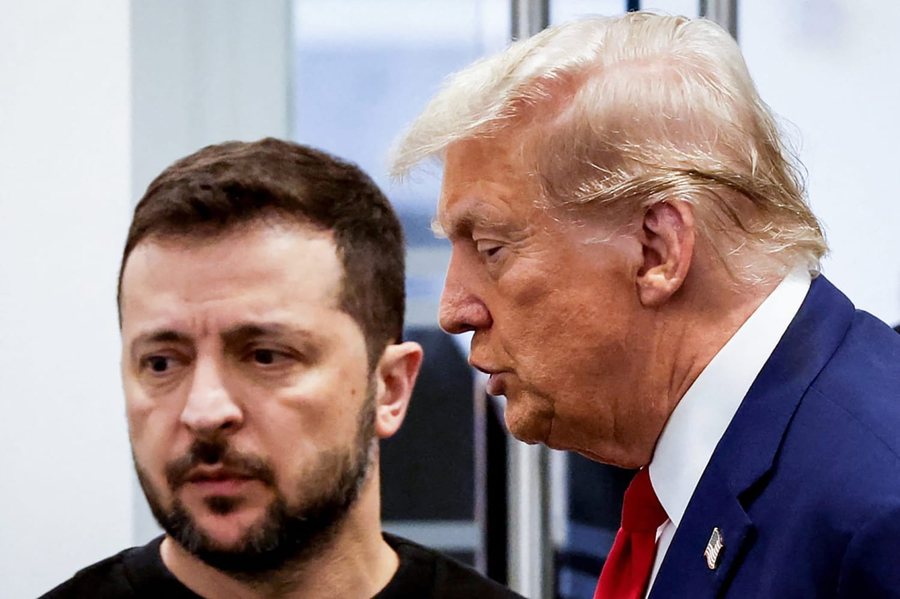
US President Donald Trump insults Europe and Ukraine and flatters Russia. What goals can the US set for its foreign policy in the future?
Donald Trump returned to the White House six weeks ago, and in a short period of time, a major shift in American foreign policy has been seen. Under Trump, Washington’s relations with Moscow are being revitalized at the expense of Ukraine, which was invaded and partially occupied by Russia. Rather than including European allies in this turnaround, the US administration is now emphasizing differences in once-shared values.
On Wednesday (February 26), Trump declared: "The EU was created to deceive the US," while on Friday (February 28) the US president, along with his Vice President JD Vance, started a feud with Volodymyr Zelensky in front of the world public.
The Ukrainian president went to the White House to sign a rare earths deal. Instead, Trump and Vance insulted him.
Is Trump ending the Western world order?
Historian Norbert Frey, who heads the Center for 20th Century History at the University of Jena, sees in all these developments the end of the world order that was established after World War II and the collapse of the Soviet Union. "The goal is clear: A global triumvirate (triple alliance, ed.) with Donald Trump, Xi Jinping and Putin," Frei told Deutschlandfunk.
"What Trump doesn't want to see is the US struggling as a declining world power. And right now they are rejecting their only remaining allies - Europe. And Europe is now completely left to its own devices."
And that is why diplomatic talks are underway in Europe to find a common response – first at a summit in London and then at an extraordinary summit in Brussels.
"I hope they understand that this is a clear change of direction in world politics," said Mikhail Alexeyev, a political scientist at the University of California, San Diego.
"The Oval Office discussion was not just a showdown between two leaders. It concealed a signal of greater US distancing from Europe. We can no longer take American security guarantees, not only for Ukraine, but perhaps even for NATO, for granted."
A year ago, during his election campaign, Trump questioned Washington's military support for NATO members that spend less than the agreed amount on defense. He even said that he would "encourage Russia to do whatever it wants" with those countries that don't pay. Trump said this in February 2024 during his speech in South Carolina, while on another occasion he called on Europeans to invest "five percent of their gross domestic product on defense."
Will there be a complete break with Europe?
Laura von Daniels, who heads the Americas working group at the Berlin-based Foundation for Science and Policy (SWP), says there has been great anxiety, but that a complete breakdown in transatlantic relations cannot currently be discerned.
"I believe that the situation will be difficult and that he is willing to harm the interests of the European Union. Both in security policy and in economic policy, such as punitive tariffs. That is all true. But it is not in his interest to cut off all relations with Europe overnight," she thinks.
Von Daniels points to Trump's economic plans, such as treating Europe as a major market for American liquefied natural gas. So the economic pressure will be increasing. "In March, tariffs on steel and aluminum will come," says Von Daniels, adding that in the spring and summer, Europe should expect to see new tariffs, for example on cars.
Trump wants to use these measures to equalize the trade balance between the EU and the US. According to US data, in 2024 the United States bought almost a trillion more goods and services from the EU than the EU bought from the US.
Von Daniels believes that the existing transatlantic relationship is beneficial to Trump. "Of course, it's a legitimate question whether they still define themselves as an alliance of Western values."
Gabriel: Trump wants to weaken Europe
Former German Foreign Minister Sigmar Gabriel, a Social Democrat who now heads the Atlantic Bridge organization, believes that the Trump administration no longer sees Europe as an ally. Gabriel told a German newspaper that Trump "cannot find anything in common with Europe, because his worldview is almost completely opposite to our European understanding of cooperation. I am almost certain that he wants to weaken or even destroy Europe."
Regarding the upcoming talks between Trump and Putin on ending the war in Ukraine, Gabriel recalls the conference held in Yalta, where the US, the Soviet Union and Great Britain decided to divide Germany after the end of World War II.
"Trump has in mind a kind of 'Yalta 2.0,' where the 'strongmen' of world politics would divide the world into spheres of interest while the little guys would have to see how they would get along," Gabriel said.
Ukraine an obstacle to direct negotiations with Putin
Laura von Daniels says it's unclear what Trump's ultimate goal is, but it became clear Friday that Ukraine is an obstacle to his path to direct negotiations with Putin. She said of the Oval Office squabble that it "has the hallmarks of what we know about authoritarian heads of state."
The Washington Institute for the Study of War has published an analysis according to which the suspension of US military aid to Kiev would increase the "chance of a Russian victory" in Ukraine, in its ambition to increase control over former Soviet republics, such as Estonia, Latvia and Lithuania, while the influence of the United States in the world would decrease./ DW (A2 Televizion)











